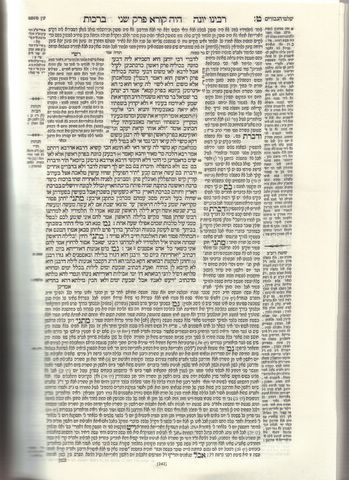
HIDE/SHOW IMAGE
9b
according to the opinion of Rabbi Yochanan who holds that you need intent during the entire first perek, as we wrote before, but according to Rava it is not because you need intent in the entire first perek that it says to stop their work, but rather so as not to make it {the Shema} temporary, like that which we learn in the first perek of Yoma {daf 19b}:
Rabbi Yitzchak bar Shmuel bar Marta cited Rav: One who reads the Shema should not wink with his eyes, nor whistle with his lips, nor point {/make signs} with his fingers. And we learned {in a brayta}: Rabbi Eliezer Chosma says: One who reads the Shema and winks with his eyes, whistles with his lips, or points with his fingers, upon him the verse states (Yeshaya 43:)and we establish in the first perek and the Sages explain that it is because he made it temporary. Here too, if he does not stop his work, he makes it {the Shema} temporary. For if you do not say this, it is a question Rava upon Rava, for over there, Rava says that the halacha is like Rabbi Meir {as he ruled earlier in Brachot like Rabbi Meir that you need intent only on the first pasuk}, and here he says {or would seem to say} that you need intent in the first perek. Rather do we not derive from this as we have said, such that you do not have a question Rava on Rava.{but instead you are calling to someone else.}
כב וְלֹא-אֹתִי קָרָאתָ, יַעֲקֹב: כִּי-יָגַעְתָּ בִּי, יִשְׂרָאֵל. 22 Yet thou hast not called upon Me, O Jacob, neither hast thou wearied thyself about Me, O Israel.
We learnt in Yoma {daf 19b}:
The Sages learnt {in a brayta}: Dvarim 6:7:The Sages learnt {in a brayta}: The workmen who do work next to the employer read the Shema, pray {Shemoneh Esrei}, and eat their bread, and bless before it, and after it two blessings. How so? The first blessing {after it} as it was established, and the second, he begins with the blessing on the Land {Nodeh Lecha} and includes in it boneh yerushalayim {Builder of Yerushalayim} in the blessing of the Land, and finishes with the blessing on the Land {Baruch Ata Hashem Al HaAretz VeAl HaMazon}. In what are these matters said? When they work for wages. But when they work for their food, or when the employer eats with them, they bentch in its usual established formulation.
{Rashi explains cites Rav Hai Gaon as saying this means Shema you speak loud enough to hear but Shemoneh Esrei you say silently, while Tosafot interprets it to refer to answering because of honor or fear.}
וְדִבַּרְתָּ בָּם - In them you may talk {Rashi: divrei Torah} but not other matters {silly things}.
וְדִבַּרְתָּ בָּם -make them permanant.
MISHNAH:
A BRIDEGROOM IS EXEMPT FROM THE RECITAL OF THE SHEMA' FROM THE FIRST NIGHT UNTIL THE END OF THE SABBATH, IF HE HAS NOT CONSUMMATED THE MARRIAGE.
IT HAPPENED WITH R. GAMALIEL THAT WHEN HE MARRIED HE RECITED THE SHEMA ON THE FIRST NIGHT:
SO HIS DISCIPLES SAID TO HIM: OUR MASTER, YOU HAVE TAUGHT US THAT A BRIDEGROOM IS EXEMPT FROM THE RECITAL OF THE SHEMA'.
HE REPLIED TO THEM: I WILL NOT LISTEN TO YOU TO REMOVE FROM MYSELF THE KINGSHIP OF HEAVEN EVEN FOR A MOMENT.
Gemara:
From where do we know these words?
For the Sages have learnt {in a brayta}: (Devarim 6:7)
mitzvah.From here we derive that one who marries a virgin is exempt, and {one who marries} a widow is obligated {to read} for he is not distracted.
וּבְלֶכְתְּךָ בַדֶּרֶךְ - "and when thou walkest by the way" - to the exclusion of a bridegroom.
MISHNAH.
[RABBAN GAMALIEL] BATHED ON THE FIRST NIGHT AFTER THE DEATH OF HIS WIFE.
HIS DISCIPLES SAID TO HIM: YOU HAVE TAUGHT US, SIR, THAT A MOURNER IS FORBIDDEN TO BATHE.
HE REPLIED TO THEM: I AM NOT LIKE OTHER MEN, BEING VERY DELICATE
Gemara:
What is the reason? aninut {mourning of the first day, or before burial} is Biblical only in the day {and not the night} for it states (Amos 8:10)
istinis {a delicate individual} the Sages did not decree.
And we see that a few rabbis write that it is specifically abban Gamliel who holds that aninut of night is Rabbinic in origin, and that we do not hold like him. And even though it say 7 days
{in Bereishit 50:10, regarding the mourning for Yaakov:
yamim - days might imply days but not nights,
}
nights are encompassed within {the meaning of} "days." And I saw a thing that these rabbis maintain that {all} the 7 days of mourning are Biblical, and they derive it from {the verse cited above,} וַיַּעַשׂ לְאָבִיו אֵבֶל, שִׁבְעַת יָמִים, " and he made a mourning for his father seven days."
And the matter is not so, for we say explicitly



No comments:
Post a Comment